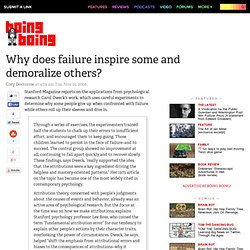

Carol Dweck: Mindset interview. Carol Dweck, Growth Mindsets and Motivation. Perfectionism and coping with daily failures: Positive reframing helps achieve satisfaction at the end of the day - Kent Academic Repository. Stoeber, J. and Janssen, D.P. (2011) Perfectionism and coping with daily failures: Positive reframing helps achieve satisfaction at the end of the day.

Anxiety, Stress, & Coping, 24 (5). pp. 477-497. (Full text available) Differentiating perfectionistic strivings and perfectionistic concerns, the present study examined how perfectionism predicts what coping strategies people use when dealing with failures, and how perfectionism and coping influence people’s satisfaction. A sample of 149 students completed daily reports for 3 to 14 days reporting the most bothersome failure they experienced during the day, what strategies they used to cope with the failure, and how satisfied they felt at the end of the day.
Using Humor to Deal With Setbacks. By Rick Nauert PhD Senior News Editor Reviewed by John M.

Grohol, Psy.D. on July 15, 2011 A new study finds that positive reframing — looking at a thing in a different light — and perhaps laughing about life’s daily small setbacks is an effective way to feel satisfied at the end of the day. Researchers used a diary study to review the strategies people use to deal with the small setbacks and failures that we all experience on a daily basis. In the study, 149 students completed daily diary reports for 3 to 14 days, reporting the most bothersome failure they experienced during the day, what strategies they used to cope with the failure, and how satisfied they felt at the end of the day.
Students used a variety of coping strategies including emotional or instrumental support; self-distraction; denial; religion; venting; substance use; self-blame; and behavioral disengagement. This strategy helped students deal with failures and feel satisfied at the end of the day. Psychologists Drs. Positive reframing, acceptance and humor are the most effective coping strategies. New research from the University of Kent has revealed that positive reframing, acceptance and humour are the most effective coping strategies for people dealing with failures.

In a paper published by the international journal Anxiety, Stress & Coping, Dr Joachim Stoeber and Dr Dirk Janssen from the University's School of Psychology describe a diary study that found these three strategies to be most effective in dealing with small failures and setbacks, and helping people to keep up their spirits and feel satisfied at the end of the day.
For the study, a sample of 149 students completed daily diary reports for 3 -- 14 days, reporting the most bothersome failure they experienced during the day, what strategies they used to cope with the failure, and how satisfied they felt at the end of the day. Their coping strategies included: using emotional or instrumental support; self-distraction; denial; religion; venting; substance use; self-blame; and behavioural disengagement. Why does failure inspire some and demoralize others? Stanford Magazine reports on the applications from psychological research Carol Dweck's work, which uses careful experiments to determine why some people give up when confronted with failure, while others roll up their sleeves and dive in.

Through a series of exercises, the experimenters trained half the students to chalk up their errors to insufficient effort, and encouraged them to keep going. Those children learned to persist in the face of failure–and to succeed. The control group showed no improvement at all, continuing to fall apart quickly and to recover slowly. These findings, says Dweck, “really supported the idea that the attributions were a key ingredient driving the helpless and mastery-oriented patterns.” Her 1975 article on the topic has become one of the most widely cited in contemporary psychology. The Effort Effect, Carol Dweck's book, "Mindset: The New Psychology of Success" (Thanks, Dad!)